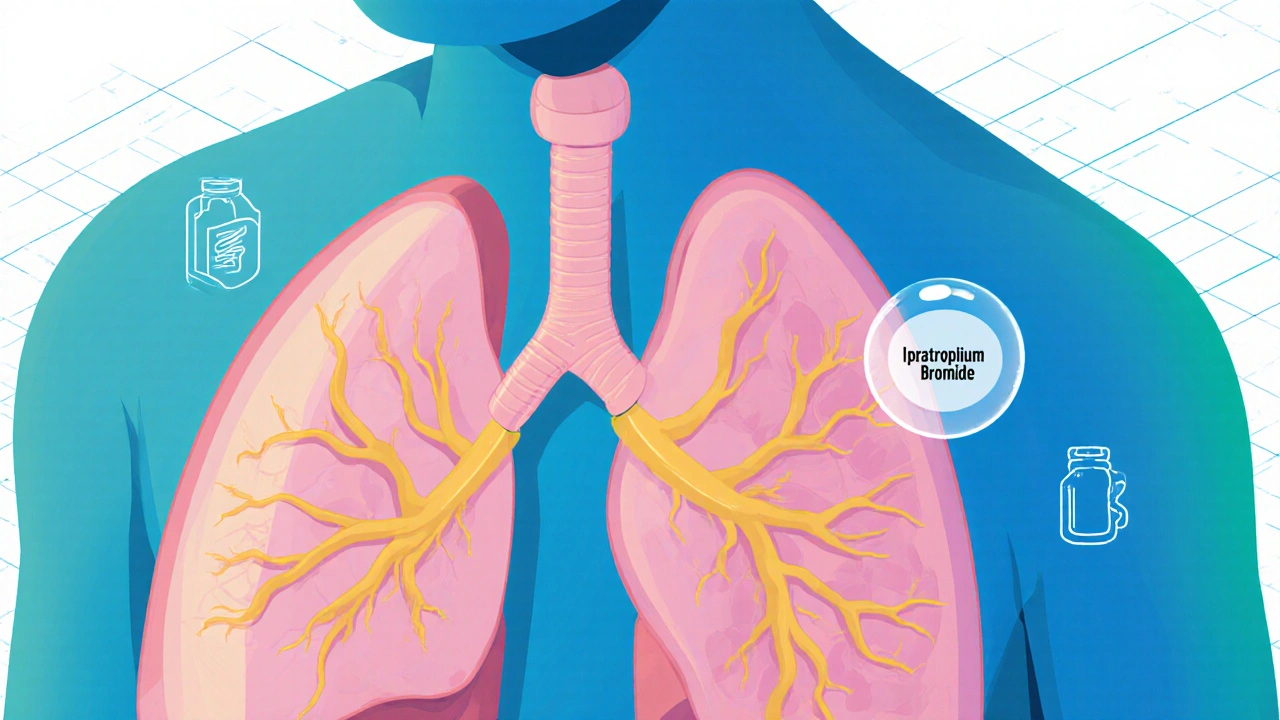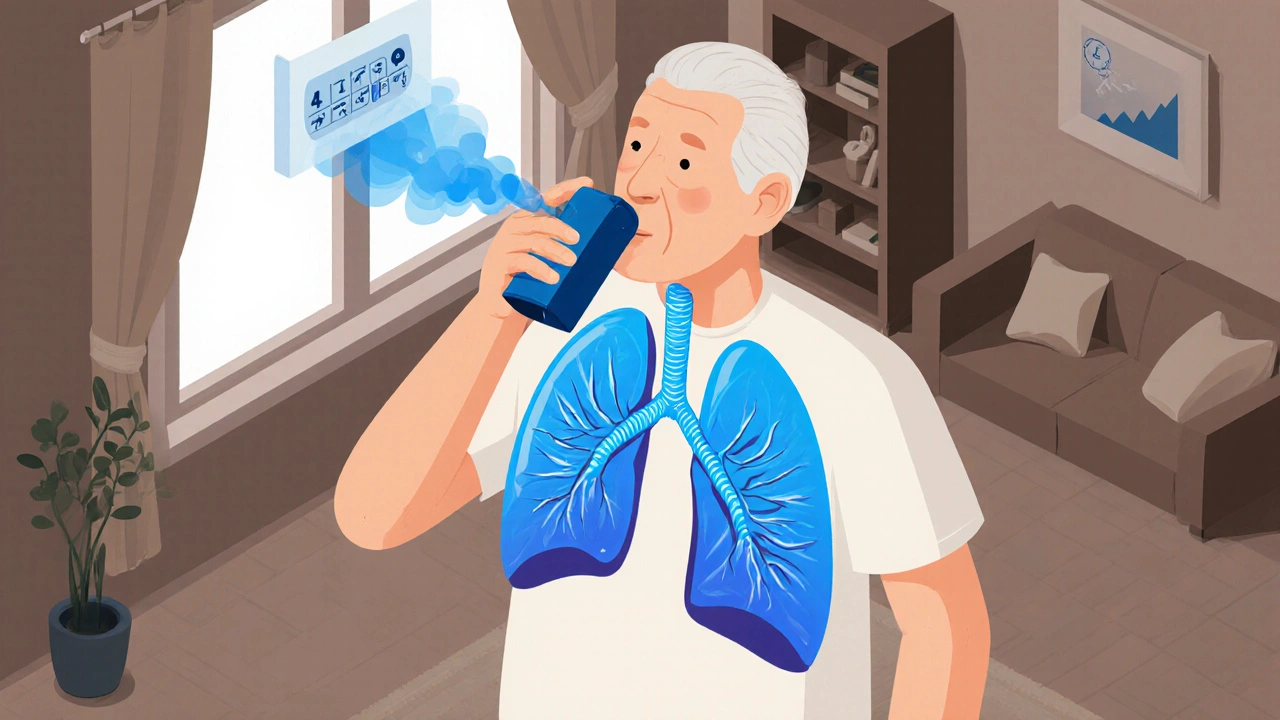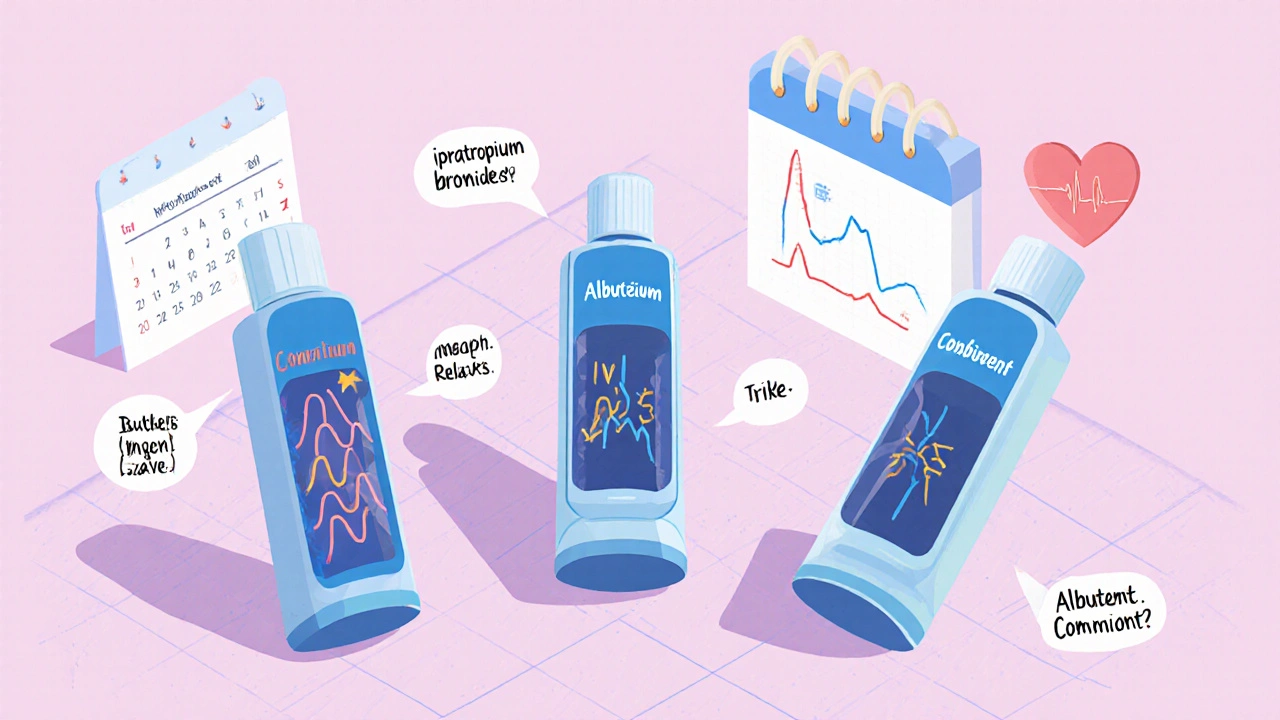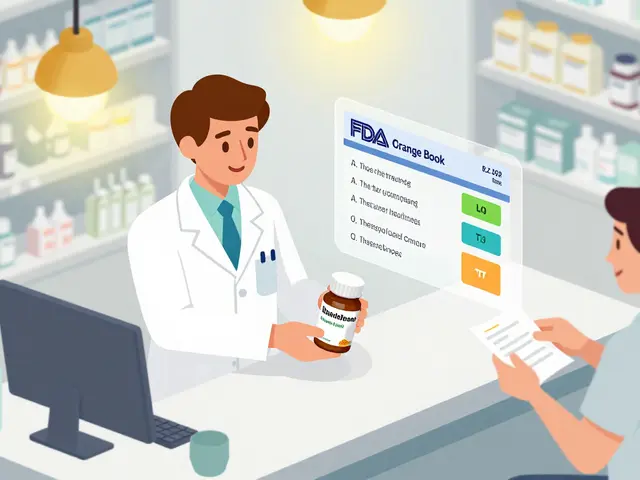Ipratropium Bromide: How It Opens Airways and Relieves Breathing Trouble

When your airways tighten up and breathing feels like trying to suck air through a straw, ipratropium bromide is often the quiet hero that helps you catch your breath. It doesn’t cure COPD or asthma, but for millions of people struggling with chronic breathing problems, it’s a daily tool that makes life possible. Unlike fast-acting rescue inhalers like albuterol, ipratropium bromide works differently-slower, steadier, and with fewer side effects for many users.
What Is Ipratropium Bromide?
Ipratropium bromide is an anticholinergic bronchodilator. That sounds complicated, but here’s what it actually means: it blocks the action of acetylcholine, a chemical in your body that causes muscles around your airways to tighten. When those muscles relax, your bronchial tubes open up, letting more air flow in and out of your lungs.
It’s not new-first approved in the 1970s-but it’s still widely used today, especially for people with chronic obstructive pulmonary disease (COPD). The U.S. National Institutes of Health estimates over 16 million Americans have been diagnosed with COPD, and many rely on ipratropium bromide as part of their maintenance plan. In the UK, the NHS prescribes it routinely for patients with emphysema or chronic bronchitis.
The drug comes in three main forms: a hand-held inhaler (Atrovent), a nebulizer solution, and sometimes combined with albuterol in a single inhaler (Combivent). Each form delivers the same active ingredient, but the delivery method changes how quickly and how long it works.
How It Works in the Lungs
Think of your airways like garden hoses. When they’re constricted, water (or air) can’t flow freely. In COPD and some types of asthma, the muscles around the airways go into spasm, and mucus builds up. Ipratropium bromide doesn’t dissolve mucus, but it stops the muscles from squeezing tighter.
It starts working within 15 to 30 minutes after inhalation. Most people feel relief within an hour, and the effect lasts about 4 to 6 hours. That’s why it’s often taken 3 to 4 times a day-regularly, not just when symptoms flare up. It’s a maintenance drug, not a rescue drug. If you’re wheezing and can’t catch your breath right now, you need something faster, like albuterol.
What makes ipratropium bromide useful is its safety profile. It doesn’t affect the heart like beta-agonists can. People with heart conditions or high blood pressure often tolerate it better than other bronchodilators. That’s why doctors often choose it for older adults or those with multiple health issues.
Who Uses It and Why
The biggest group using ipratropium bromide is people with COPD. Studies show it reduces exacerbations-those scary flare-ups that land people in hospital. A 2023 analysis of over 12,000 COPD patients found those using ipratropium bromide regularly had a 22% lower risk of hospital admission compared to those who didn’t.
It’s also used in some asthma cases, especially when beta-agonists aren’t enough or cause side effects like tremors or rapid heartbeat. Children with severe asthma attacks sometimes get it in the emergency room via nebulizer, often alongside albuterol.
People with chronic bronchitis, especially those who smoke or used to smoke, benefit most. The drug helps clear the airway by reducing muscle tightness, even if mucus is still present. It doesn’t dry up secretions the way some expect-it actually helps keep them from becoming too thick by allowing better airflow and coughing.

How to Use It Correctly
Getting the most out of ipratropium bromide means using the inhaler or nebulizer right. Too many people waste their medication because they don’t coordinate breathing with the puff.
For the inhaler:
- Shake the inhaler well.
- Breathe out fully, away from the device.
- Place the mouthpiece between your lips and seal them.
- Start breathing in slowly and press the canister to release one puff.
- Keep breathing in deeply, then hold your breath for 5 to 10 seconds.
- Breathe out slowly.
If you need a second puff, wait at least a minute between doses. Rinse your mouth with water afterward to avoid dry mouth or thrush.
For nebulizer use, the solution is mixed with saline and breathed in through a mask or mouthpiece over 5 to 15 minutes. It’s easier for people with weak hand strength or severe breathing trouble.
Never use it more than prescribed. Overuse can lead to side effects like blurred vision, urinary retention, or constipation-especially in older adults.
Side Effects and Risks
Most people tolerate ipratropium bromide well. The most common side effects are mild: dry mouth, bitter taste, headache, or sore throat. These usually fade after a few days.
Less common but more serious risks include:
- Difficulty urinating-especially in men with enlarged prostates
- Worsening glaucoma-don’t use if you have narrow-angle glaucoma
- Allergic reactions-rash, swelling, or trouble breathing after use (rare)
If you feel your heart racing, your vision blurs, or you can’t pee after using it, stop and call your doctor. These aren’t common, but they’re important to watch for.
It’s safe during pregnancy and breastfeeding when prescribed. The amount absorbed into the bloodstream is very low, so it doesn’t affect the baby. Still, always tell your doctor if you’re pregnant or nursing.
How It Compares to Other Treatments
Ipratropium bromide isn’t the only bronchodilator. Here’s how it stacks up against others:
| Drug | Type | Onset | Duration | Best For | Common Side Effects |
|---|---|---|---|---|---|
| Ipratropium bromide | Anticholinergic | 15-30 minutes | 4-6 hours | COPD, chronic bronchitis, maintenance use | Dry mouth, bitter taste |
| Albuterol | Beta-agonist | 5-15 minutes | 4-6 hours | Asthma, acute attacks | Tremor, fast heartbeat, nervousness |
| Formoterol | Long-acting beta-agonist | 5-10 minutes | 12 hours | Long-term control, combined with steroids | Headache, muscle cramps |
| Tiotropium | Long-acting anticholinergic | 30 minutes | 24 hours | COPD, once-daily maintenance | Dry mouth, constipation |
Notice how tiotropium is the long-acting cousin of ipratropium bromide. If you need once-daily dosing, tiotropium might be a better fit. But for people who need quick, reliable relief multiple times a day, ipratropium bromide remains a top choice.

What You Should Know Before Starting
Before you begin using ipratropium bromide, make sure your doctor knows about:
- Any history of glaucoma or urinary problems
- Other medications you take, especially other anticholinergics
- If you’re allergic to atropine or similar drugs
- If you’re taking any heart medications
It’s also important to understand this isn’t a cure. It doesn’t fix lung damage from smoking or pollution. It just helps you breathe better while you manage the underlying condition. That’s why quitting smoking, avoiding air pollution, and doing pulmonary rehab are just as important as the inhaler.
Keep your inhaler with you. Don’t wait until you’re gasping to use it. Use it as scheduled-even on days you feel fine. That’s how it keeps your airways open long-term.
What to Do If It Doesn’t Work
If you’ve been using ipratropium bromide regularly for two weeks and still feel tightness in your chest or need your rescue inhaler more than twice a week, talk to your doctor. It might mean:
- Your dose needs adjusting
- You need a combination inhaler (like Combivent)
- You need an inhaled steroid added to reduce inflammation
- Your diagnosis needs re-evaluating
Don’t increase the dose yourself. More isn’t better-it just increases side effects. Your doctor might switch you to tiotropium or add a steroid like fluticasone. Many people do better on combination therapy.
Final Thoughts
Ipratropium bromide isn’t flashy. It doesn’t make headlines. But for people with COPD, it’s one of the most reliable tools they have. It’s affordable, safe for long-term use, and works well even when other drugs don’t.
If you’re using it, you’re not alone. Millions of people around the world breathe easier because of it. The key is using it right, consistently, and knowing when to ask for help if it’s not enough.
Can Ipratropium Bromide be used for asthma?
Yes, but usually as a second-line option. It’s most common in COPD, but doctors may prescribe it for asthma when beta-agonists like albuterol cause side effects such as rapid heartbeat or tremors. It’s also used in emergency rooms for severe asthma attacks, often alongside albuterol. It doesn’t work as quickly as albuterol, so it’s not a rescue inhaler for sudden asthma symptoms.
How long does it take for ipratropium bromide to work?
You’ll usually start to feel better within 15 to 30 minutes after inhaling it. The full effect kicks in around one hour and lasts for 4 to 6 hours. That’s why it’s taken multiple times a day-it’s meant for regular maintenance, not emergency relief.
Is ipratropium bromide safe for older adults?
Yes, it’s often preferred for older patients because it doesn’t affect the heart like beta-agonists do. But older adults are more sensitive to its side effects, like trouble urinating or constipation. If you’re over 65 and have an enlarged prostate or glaucoma, tell your doctor before starting. Dosing is usually the same, but monitoring is important.
Can I use ipratropium bromide with albuterol?
Absolutely. In fact, many people use both together. Albuterol opens airways fast, while ipratropium bromide helps keep them open longer. They work in different ways, so they complement each other. Combination inhalers like Combivent already contain both. If you’re using separate inhalers, wait at least one minute between doses.
Does ipratropium bromide cause weight gain?
No, ipratropium bromide does not cause weight gain. Unlike inhaled steroids, which can sometimes increase appetite or cause fluid retention, ipratropium bromide has no known effect on metabolism or weight. Any weight changes while using it are likely due to other factors like reduced activity from breathing trouble or changes in diet.
What happens if I miss a dose?
If you miss a dose, take it as soon as you remember. But if it’s almost time for your next dose, skip the missed one. Don’t double up to make up for it. Missing one dose won’t cause immediate problems, but skipping regularly can make your breathing worse over time. Try setting a phone alarm to help you stay on track.
Can Ipratropium Bromide be used long-term?
Yes, it’s designed for long-term use. Many people take it daily for years without serious issues. It doesn’t cause tolerance like some medications-meaning you won’t need higher doses over time to get the same effect. Regular use helps prevent flare-ups and keeps airways more open. Always follow your doctor’s instructions and have check-ups to make sure it’s still the right choice for you.






Comments (8)
Ashley Miller
20 Nov 2025
Of course it works-because the pharmaceutical giants *want* you to believe it’s safe. They’ve been hiding the truth since the 70s. Ipratropium? More like Ipratropium-BRAINWASH. They pump it into your lungs so you don’t notice the 5G towers in your inhaler. Dry mouth? That’s your body trying to detox from the microchips. You think this is medicine? It’s a slow-acting mind control agent disguised as a bronchodilator. Ask yourself-why does it *never* cure anything? Just keep you hooked. Keep breathing. Keep buying.
Sherri Naslund
20 Nov 2025
ok so like i read this whole thing and i’m just sitting here wondering why we’re all still using inhalers when we could just like… meditate more?? i mean if your lungs are tight maybe it’s not the airways it’s your soul?? like have you tried breathwork or grounding or even just screaming into a pillow for 10 mins?? i used to have asthma and i stopped using my inhaler and started journaling and now i can run a mile without wheezing and i didn’t even need to be ‘prescribed’ anything. also i think ipratropium is just a placebo wrapped in latin. why do we trust doctors more than our own bodies??
Martin Rodrigue
21 Nov 2025
While the article provides a clinically accurate overview of ipratropium bromide’s pharmacological profile, it falls short in addressing the broader epidemiological context of anticholinergic burden in aging populations. The drug’s half-life and peripheral muscarinic receptor affinity contribute to cumulative cognitive decline over prolonged use, particularly in individuals over 65 with polypharmacy. A 2022 JAMA Internal Medicine meta-analysis demonstrated a 14% increased risk of dementia associated with long-term anticholinergic exposure-this is not adequately highlighted. Furthermore, the comparison table omits pharmacokinetic variables such as hepatic metabolism via CYP3A4, which is critical for patients on statins or macrolides. The omission of these interactions renders the guidance incomplete and potentially hazardous.
Will Phillips
22 Nov 2025
They told you it’s safe but they lied. I know a guy who used this stuff for 12 years and then he couldn’t pee for 3 days. They don’t tell you that. They don’t tell you that the government approved it because Big Pharma paid off the FDA. And now you’re all just sitting here nodding like good little patients while your kidneys turn to dust. I saw a video on TikTok where a guy said ipratropium makes your pupils dilate so the CIA can track you. I didn’t believe it… until I started seeing the glint in my dog’s eyes after I used it. Coincidence? I think not. You think you’re breathing better? You’re just being programmed.
Arun Mohan
23 Nov 2025
Look i’ve read the entire NIH study and honestly? This is so basic. Like… i’ve been studying respiratory pharmacology since i was 17 and honestly ipratropium is just the 1970s version of a bandaid. You want real relief? Try nebulized magnesium or low-dose naltrexone. Or better yet-get off the processed food and start doing breath holds. I’ve had patients reverse their COPD just by fasting and doing pranayama. This drug? It’s for people who don’t want to change their lifestyle. You think your airways are the problem? No. Your life is the problem. And no inhaler fixes that.
Tyrone Luton
25 Nov 2025
It’s funny how we treat medicine like a magic wand. We hand out inhalers like candy and never ask why the lungs are failing in the first place. Ipratropium doesn’t heal-it just lets you keep living in the same toxic world. The real question isn’t how it works-it’s why we need it at all. Why are so many people breathing through straws? Why is the air so thick? Why are we treating symptoms instead of causes? The answer isn’t in a pill. It’s in the smokestacks, the highways, the silence we’ve accepted. We don’t need more drugs-we need more courage.
Jeff Moeller
26 Nov 2025
Just used my ipratropium today. Felt like a weight lifted. No drama. No hype. Just air. I’ve been on it for 8 years. No side effects. No drama. Just breathing. People overthink everything. This isn’t a conspiracy. It’s a tool. Use it right. Don’t overthink it. Just breathe.
Herbert Scheffknecht
27 Nov 2025
There’s something deeply poetic about ipratropium bromide. It doesn’t scream for attention like albuterol. It doesn’t promise miracles. It just… holds space. It says: I’m here when you need me. Not flashy. Not loud. Just steady. Like an old friend who shows up with tea when you’re too tired to speak. It doesn’t fix the broken world that made your lungs weak-but it lets you sit in it without drowning. Maybe that’s enough. Maybe healing isn’t always about fixing. Maybe sometimes it’s just about letting the air in. Even if it’s slow. Even if it’s quiet. Even if it’s just for four hours at a time.